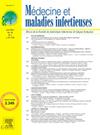Management of oral antiretroviral administration in patients with swallowing disorders or with an enteral feeding tube
Abstract
HIV infection has evolved into a chronic disease with comorbidities since the combination antiretroviral therapy era. Complications still occur and patients may need to be admitted to an intensive care unit. Acute respiratory failure is the first cause of these admissions, questioning the administration of solid oral dosage formulations. This issue is also observed in geriatric units where the prevalence of dysphagia is high and underestimated. The problem of antiretroviral administration is critical: altered solid oral dosage formulations and/or administration via enteral feeding tubes are sometimes the only option. The aim is to help manage antiretroviral treatment in unconscious or intubated patients and those with swallowing disorders who are hospitalized in intensive care units or geriatric units. This review provides information on the main antiretroviral regimens and on practical and legal aspects of manipulating solid oral dosage formulations and administration via enteral feeding tubes. Alternatives to the solid formulation are available for most of the 27 oral antiretrovirals available, or manufacturers provide recommendations for patients who are unable to swallow. Manipulation of solid oral dosage formulations such as crushing tablets or opening capsules and administration via feeding tubes are frequently reported but should be the last option for safety and liability issues. Before any off-label administration of a drug, physicians should consider alternatives to the solid oral dosage formulation and check whether the drug can be altered. Therapeutic monitoring is important in this particular setting as the pharmacokinetic profile of drugs is difficult to predict.

 求助内容:
求助内容: 应助结果提醒方式:
应助结果提醒方式:


